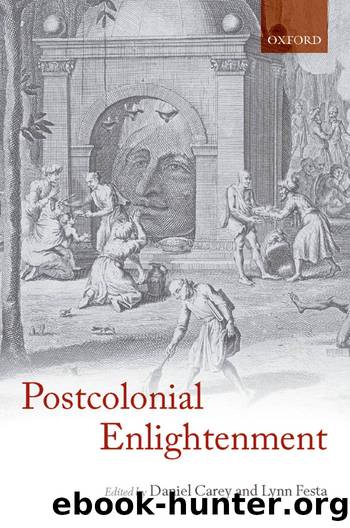The Postcolonial Enlightenment by Daniel Carey;Lynn Festa; & Lynn Festa

Author:Daniel Carey;Lynn Festa; & Lynn Festa
Language: eng
Format: epub
Publisher: OUP Premium
Published: 2007-06-15T00:00:00+00:00
1 See e.g. A. L. Macfie, Orientalism (New York: Longman, 2002), 57â8: âthe accusation that the British orientalists concerned were âorientalist,â in the critical sense ⦠cannot for the most part be sustained ⦠As children of the eighteenth-century Enlightenment,⦠they were inclined to believe that man, though culturally different, was basically the same everywhereâ¦. Rather, many Orientalists formed enduring relations with Indians, in particular members of the Bengali intelligentsiaâ¦. Were such men ⦠afflicted by the narrow racialism, nationalism and parochialism attributed to them by the critics of orientalism? It would seem improbable.â For J. J. Clarke, Oriental Enlightenment: The Encounter between Asian and Western Thought (London: Routledge, 1997), 26, âThe Saidian mode of explanation â¦is⦠too broad because, even if we allow for its cogency within the âhighâ colonial period of roughly 1800 to 1950, it becomes fragile when stretched beyond those limits.â According to John M. MacKenzie, Orientalism: History, Theory, and the Arts (Manchester: Manchester University Press, 1995), 26, âthe description applied to the activities of a group of eighteenth-century scholars who sought to rediscover the languages, arts, and laws of India comes to be identified with an ideological faction constituted of their sworn enemies⦠. Nothing could better illustrate the problems of Saidâs conception of a continuous oriental discourse.â See also David Smith, âOrientalism and Hinduismâ, in Gavid Flood (ed.), The Blackwell Companion to Hinduism (Oxford: Blackwell, 2003): âThis perverse sleight-of-hand [by Said] magics away into thin air the editions, translations, and dictionaries of the true and original Orientalists who devoted their lives to understanding the meaning of instances of Oriental culture and civlizationâ (p. 46). Smith adds, âOrientalist indologists ⦠were not âmaking a career of the Eastâ ⦠the goal ⦠was purely intellectualâ (p. 60). See also J. L. Brockington, âWarren Hastings and Orientalismâ, in Geoffrey Carnall and Colin Nicholson (eds), The Impeachment of Warren Hastings (Edinburgh: Edinburgh University Press, 1989), 91â108; S. N. Mukherjee, âEuropean Jones and Asiatic Panditsâ, Journal of the Asiatic Society, 27/1 (1985), 43â58; P. J. Marshall and Glyndwr Williams, The Great Map of Mankind: British Perceptions of the World in the Age of Enlightenment (London: Dent, 1982), 156â7; and David Kopf, âThe Historiography of British Orientalism, 1772â1992â, in Garland Cannon and Kevin R. Brine (eds), Objects of Enquiry: The Life, Contributions, and Influences of Sir William Jones (1746â1794) (New York: New York University Press, 1995), 141â60. See Carol Breckenridge and Peter van der Veer (eds), Orientalism and the Postcolonial Predicament: Perspectives on South Asia (Philadelphia: University of Pennsylvania Press, 1993) for essays that treat or touch on eighteenth-century British colonial Orientalism, generally sympathetic to but not completely in agreement with Orientalism. The essay by David Ludden, âOrientalist Empiricism: Transformations of Colonial Knowledgeâ, in Breckenridge and van der Veer (eds), Orientalism and the Postcolonial Predicament, 251â2, criticizes the lack of specificity in Saidâs use of the term âOrientalismâ.
2 Edward Said, Orientalism (New York: Vintage, 1978), 94 and 221.
3 G. W. Forrest (ed.), Selections from the State Papers of the Governors-General of India, 4 vols (Oxford: B.
Download
This site does not store any files on its server. We only index and link to content provided by other sites. Please contact the content providers to delete copyright contents if any and email us, we'll remove relevant links or contents immediately.
Verus Israel: Study of the Relations Between Christians and Jews in the Roman Empire, AD 135-425 by Marcel Simon(552)
Infocracy by Byung-Chul Han(541)
Caesar Rules: The Emperor in the Changing Roman World (c. 50 BC â AD 565) by Olivier Hekster(530)
Europe, Strategy and Armed Forces by Sven Biscop Jo Coelmont(477)
Banned in the U.S.A. : A Reference Guide to Book Censorship in Schools and Public Libraries by Herbert N. Foerstel(448)
Reading Colonial Japan by Mason Michele;Lee Helen;(444)
The Roman World 44 BC-AD 180 by Martin Goodman(439)
Give Me Liberty, Seventh Edition by Foner Eric & DuVal Kathleen & McGirr Lisa(437)
DS001-THE MAN OF BRONZE by J.R.A(424)
The Dangerous Life and Ideas of Diogenes the Cynic by Jean-Manuel Roubineau(417)
The Oxford History of World War II by Richard Overy(415)
Introducing Christian Ethics by Samuel Wells and Ben Quash with Rebekah Eklund(412)
american english file 1 student book 3rd edition by Unknown(412)
Imperial Rome AD 193 - 284 by Ando Clifford(410)
Basic japanese A grammar and workbook by Unknown(392)
Literary Mathematics by Michael Gavin;(373)
Language Hacking Mandarin by Benny Lewis & Dr. Licheng Gu(352)
How to Reach the 9.0 in IELTS Academic Reading by IELTS Medical(333)
The Oxford History of the Renaissance by Campbell Gordon;(332)
